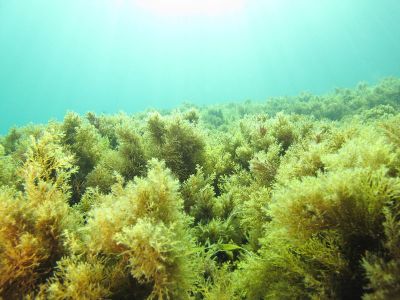Catalysing industrial change with marine-based enzymes

Underwater forest, fot. By Arnaud Abadie (Own work) [CC BY 3.0
Hardy sea-based microbes could contain enzymes ideally suited to extreme industrial processes. EU-funded researchers with the INMARE project aim to find out.
April 2015 saw the launch of an ambitious four-year EU-funded project that hopes to unlock the immense potential of marine-sourced enzymes. The consortium behind INMARE (Industrial Applications of Marine Enzymes: Innovative screening and expression platforms to discover and use the functional protein diversity from the sea) has brought together a team of world experts in order to identify novel new enzymes that could be of use to industries ranging from cosmetics to medicine.
Enzymes are used extensively in the chemical industry, and are also crucial to other industries where biological catalysts are needed. These range from brewing and biofuels to biological detergents and paper manufacturing. Marine microorganisms – such as bacteria, fungi, sponges and algae – have been recognised as an untapped source of enzymes, but remain somewhat underexploited. Only a tiny fraction of marine enzymes have achieved commercialisation.
This, the INMARE team believes, is a missed opportunity. The harsh marine environment might yield hardy ingredients already capable of surviving extreme industrial processes, which could help to cut business costs in the long run. This is because optimising enzymes – a process to make them more stable and perform better – can be time consuming and expensive, involving enhancing certain characteristics such as heat resistance or the ability to survive extreme pressure.
The INMARE project will use new screening techniques to identify potentially promising marine-base enzymes. Of special interest will be microbes capable of surviving in tough conditions such as extreme pressure, salinity or temperature. Such microbes could contain enzymes capable of performing in industrial settings under harsh physical and chemical conditions, without the need for optimisation. The project will also pioneer bioinformatics-based gene discovery technology.
Another important element of the project will be the promotion of environmental sustainability. With global resources being used up at an increasingly rapid rate, untapped microbiological resources from the sea could provide industry with an almost limitless source of safer, cheaper and greener products – so long as this resource is sensitively managed.
The project is not starting from scratch, and builds on previous EU-funded research. The MACUMBA project for example, which runs until July 2016, has helped to identify new ways of cultivating and increasing the growth efficiency of marine microorganisms in both conventional and extreme habitats. Similarly, the EU-funded MAMBA project developed new methods for screening microorganisms for useful enzyme activity.
In addition, the INMARE consortium already has access to over 100 gene libraries, containing microbes from a variety of environments that can be immediately subjected to screening. The team intends to build on this library with DNA extracted from extreme marine environments that have as yet not been properly investigated.
INMARE consists of more than 20 partners from academia and industry in 12 countries, including leading multinational industrial partners. By 2019, the project hopes to have discovered microbial enzymes capable of delivering environmentally friendly fine chemicals, new cleaning technologies and even anti-cancer drugs.
published: 2015-05-04